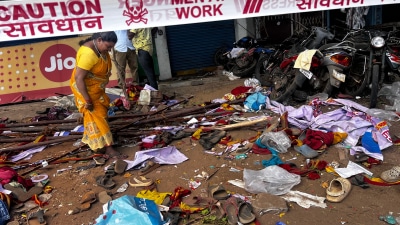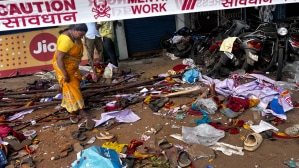Bruised BJP gets its salve: allies say yes yes on Ayodhya
Wracked by inner-party feuds and pilloried by affiliates in the saffron brotherhood, the BJP finally had something to smile about today when...

Wracked by inner-party feuds and pilloried by affiliates in the saffron brotherhood, the BJP finally had something to smile about today when the NDA—contrary to threats meted out earlier—broadly endorsed the party’s stand on secularism, Ayodhya, and the arrest of the Kanchi Shankaracharya.
The NDA meeting had been convened following misgivings among alliance partners—particularly the Janata Dal (United)—about the BJP’s return to Hindutva and L K Advani’s statements on building a Ram temple at Ayodhya.
But the resolution adopted at the meeting was closer to the BJP positions on both Hindutva and Ayodhya than even the NDA’s 2004 manifesto. And as a bonus of sorts, it was decided that George Fernandes would visit Chennai and Kanchipuram to express solidarity with the arrested pontiff.
Asked if he was going in his personal capacity or as NDA convenor, Fernandes snapped: ‘‘As NDA convenor, of course.’’ Fernandes, who had rushed to the defence of the saffron forces after the Graham Staines murder as well as during the Gujarat riots, confirmed that he would remain their most reliable ally even out of power.
On Ayodhya, the BJP leadership clearly managed to convince the NDA partners of its ambiguous position—that while a judicial verdict must be accepted by all, a ‘‘negotiated settlement’’ was a preferable option.
The 2004 manifesto had stated that the NDA ‘‘believes that an early and amicable resolution of the Ayodhya issue will strengthen national integration. We continue to hold that the judiciary’s verdict in this matter should be accepted by all. At the same time, efforts should be intensified for dialogue and a negotiated settlement in an atmosphere of mutual trust and goodwill.’’ Today’s resolution states: ‘‘The NDA believes that an early and amicable resolution of the Ayodhya issue will promote national integration and strengthen India socially as no other issue can.’’ The addition of the last nine words gives Ayodhya an unrivalled importance so far bestowed to it only by the Sangh Parivar. Moreover, unlike the manifesto which merely spoke of the need for efforts towards a negotiated settlement, today’s resolution states that ‘‘…considering the delays inherent in our judicial processes, the NDA prefers a negotiated settlement..’’ It states that the solution to the Ayodhya issue ‘‘should be such that it meets the aspirations of the majority community, concerns of the minority community and interests of national unity, integrity and communal harmony.’’ Since ‘‘aspirations of the majority community’’—as interpreted by the RSS-VHP-BJP—is the construction of a Ram temple on the exact spot where the Babri Masjid stood, the NDA also willy nilly supported this position without actually using the word Ram temple in the resolution.On secularism, today’s resolution makes an even greater departure from the May manifesto: ‘‘The NDA is committed to strengthening the Constitutional ideal of secularism as expounded by Mahatama Gandhi and other Indian seers, both ancient and modern, and as practised in Indian civilization for centuries.’’
Photos







- 01
- 02
- 03
- 04
- 05
























